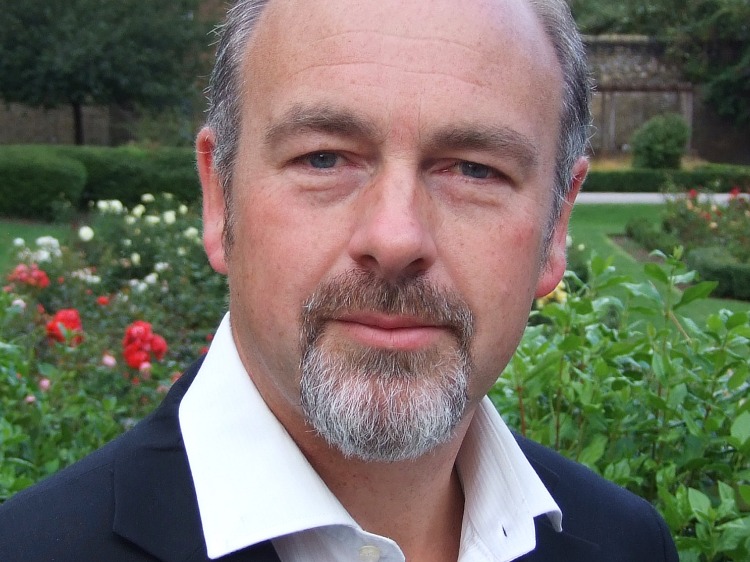Richard Black kicks off Global Journalism Innovation Lab Spring Speaker Series
The environmental reporter identified what explanatory journalism can accomplish – and what it can’t.
Environmental reporter Richard Black (external link) thinks explanatory journalism is a great way to make people understand the realities of climate change - if they want to listen, that is.
The former BBC correspondent kicked off the Global Journalism Innovation Lab’s (external link) Spring Speaker Series on Thursday April 21 with a half-hour virtual lecture on the powers and limitations of explanatory journalism. He said that while explanatory journalism is a desperately needed public service, it faces challenges connecting to the right people.
Introducing himself to the audience, Black said he expected everyone in attendance agreed climate change was a problem and ought to be prevented, but held out an olive branch to dissenters: “If there is the odd person in the room who thinks climate change is great and doesn’t see any need to stop it, well that’s absolutely fine, we can talk about that at the end, maybe.”
Black spoke calmly, except when he seemed to challenge world leaders. After reading out the concluding words of the (PDF file) latest IPCC report (external link) , which warned of “a brief and rapidly closing window of opportunity to secure a liveable and sustainable future for all,” he pointed out that the statement had been ratified by delegates from just about every world government. As if speaking to those governments, Black raised raised his voice and posed the question: “So what are you doing about it?”
His talk took the audience through the promise and challenges of writing explanatory journalism focused on global catastrophe, a topic that he said “offers huge, rich pickings for explaining,” for a few good reasons: climate change is a long-term issue that requires present action to avoid far-away future costs, it involves international conferences that are stupefying both politically and procedurally, and all of it traffics in science that must be broken down for the everyday reader.
By the same token, it works as a good example of the conceptual challenges at the heart of explanatory journalism. Black went through a fair few – beginning with an existential question: What is explanatory journalism, and how does it differ from other journalism in the first place? After all, he noted, there’s overlap between the two. “The explainer needs to carry elements of the story within it, and the story has to carry elements of explanation within it,” he said. “If you don’t do that, neither piece actually works.”
Black also noted that plenty of other organizations, like universities and think tanks, are making good explainers (external link) , as are ordinary people. Black recalled the start of the COVID-19 pandemic in the UK, when he was convinced to stay home from the office not by an official body, but by an average person on the internet who had looked at the science and produced a sound argument in favor of isolation.
So given the competition, why should journalists bother writing explainers themselves? Black said that in principle, journalists bring “objectivity,” in that they aren’t the institution that produced the report being reported on, nor are they a campaign group with an agenda. Journalists also tend to understand their audiences, and work quickly. But their work isn’t effective if they just call up scientists and report what they say. When you do that, said Black, “you haven’t necessarily done anything that the scientist wouldn’t have done themselves.” He also cautioned journalists to focus their efforts where it is most valuable. “There's no point in putting a lot of effort into doing an explainer if someone has already done one," he said. "We're all part of this rich mix now."
And yet despite that rich mix of explanatory journalism, Black noted that greenhouse gas emissions continue to rise–so perhaps the information isn’t getting where it needs to go. Black thinks it’s people who are already interested and knowledgeable on the topic that most often consume explanatory journalism – the exact group that needs an explanation the least. “I think this is a limitation on the value of explanatory journalism,” he said. Which leads to the title of the talk: explanatory journalism is necessary but not sufficient–we need information about climate change, but information alone won’t solve the problem. An important reason for this, says Black, is that while data are important, readers need material that connects visually and emotionally. He noted the impact of Swedish activist Greta Thunberg, and said her personal story connected with audiences in a way that doesn’t happen with data alone.
Audience members challenged Black on how to write explainers for people who just don’t want to hear them. Black talked about his previous work on climate denial (external link) , saying that while you should entertain good faith criticism, there are people and groups dedicated to spreading misinformation who will happily drag you into rabbit holes. This problem, however, is not limited to the climate denier wing.
Black made a similar point about certain climate activists. Discussing environmental activist group Extinction Rebellion, Black said, “Some of them seriously believe that, you know, life on Earth, humanity basically is threatened on the timescale of a few decades … which is absolutely not backed up by the evidence. So how can you deal with that?” For one thing, he said, you can direct your efforts at bystanders who may be persuaded by the activists’ arguments and recognize that those who are entrenched in their beliefs might be a lost cause.
Nevertheless, you do your best. “The more you can present the balanced, nuanced picture, the better,” he said. “But not everyone’s going to want to see it.”



